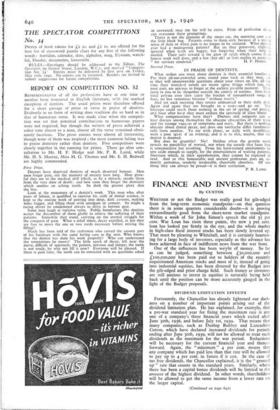REPORT ON COMPETITION NO. 32 REPRESENTATIVES of all the professions
have at one time or another been honoured in English literature, with the marked exception of dentists. The usual prizes were therefore offered for a short passage of prose or verse in praise of dentists. Evidently in no form of writing does tradition die so hard as in that of humorous verse. It was made clear when the competi- tion was set that potential contributions to humorous papers were not required, but though the writers of prose achieved a sober tone almost to a man, almost all the verse remained obsti- nately facetious. The prose entries were almost all interesting, though none of them was inspired ; the most common failing was to praise dentistry rather than dentists. Five competitors were closely together in the running for prizes. These go after con- sultation to Mr. H. F. Hodge and Mr. P. R. Laird, while Mr. H. S. Murray, Miss M. G. Thomas and Mr. E. H. Bedwell are highly commended.
First Prize.
Doctors have deprived dentists of much deserved honour. Men soon forget pain, out the memory of anxiety lasts long. How grate- ful they are to the medical skill which, as by a miracle, recalls them from the very door of death: and how soon they forget the dentistry which soothes an aching tooth. So doth the greater glory dim the less.
Look at the monotony of a dentist's work. This man who, after years of labour, is qualified to exercise his craft of dental science, is kept to the routine work of peering into deep, dark caverns, making holes bigger, and filling them with amalgam or cement. So might a rating driver be condemned always to drive in bottom gear. Some may laugh at varicose veins. Public benefactors like dentists accept the discomfort of them gladly to relieve the suffering of their patients. Immobile they stand, carrying on the eternal struggle for the conquest of pain. What a relief when, decay expelled, at last they are free to move the one or two yards necessary before mixing the filling! Much has been told of the craftsman who carved the unseen part of his furniture with the same loving care as the seen. Who knows that the dentist has done his work properly? Who can understand the temptations he meets? The little speck of decay, left near the nerve, difficult of approach; the patient, nervous and jumpy; the tooth is not ready, by why not fill it now? Everyone will be pleased. If there is pain later, the tooth can be extracted with no questions asked
or answered; oruy the fee will be extra. Pride of profession alc,:ie can overcome these promptings. Theirs is not the glamour of the smart car, the morning coat the little black bag. Patients come to them only because of a str, sense of duty or when pain is no longer to be endured. What den ever had a malingering patient? But on they persevere, slight. ignored when teeth are happy, but forgiving when their help is needed. Their only reward is the glow of spirit which comes from honest work well done, and a few (but oh! so few) replies to accoulas " for services rendered." H. F. HODGE.
Second Prize.
IN PRAISE OF DENTISTS.
What strikes one most about dentists is their essential loneliness. Put their all-too-powerful arms round your neck as they may, ask as they will unanswerable questions about your views on life, all the time their wretched minds are intent upon things which you, for your part, are anxious to forget at the earliest possible moment. They seem to you to be altogether outside the comity of nations. Into their tired private lives they carry the burden of unnumbered songs of hate, no less venomous because "without words." And yet each morning they return undaunted to their daily drill. Again and again they are brought to a stop—and go on. The Gestapo could teach them nothing in the art of spying and prying, and hour after ho.ir they must endure the spectacle of alien blood.
What compensations have they? Doctors and surgeons can at least discuss among themselves the obscene obscurities of their trade and the strange vagai les of symptoms and souls. But there is nothing obscure about dental decay, nor does one toothache differ fundamen- tally from another. To toy with plates, or daily with dentifrices, were a pool sport of an evening; and it is to this, maybe, that the dentist is doomed.
But does he grumble? No! Neither when the granite tooth reveals no possibility of reward, nor when the mouth that faces him is remunerative but revolting. From his hard-earned emoluments he sets aside enough to supply, for the entertainment of waiting patients, literature which, in their apprehension, they cannot be expected to read. And so this honourable and ancient profession goes on, re- motely garrulous, tenderly intolerable, cheerfully cheerless. Of one thing they can always be proud—it is their extraction.
P. R. LAIRD


































 Previous page
Previous page